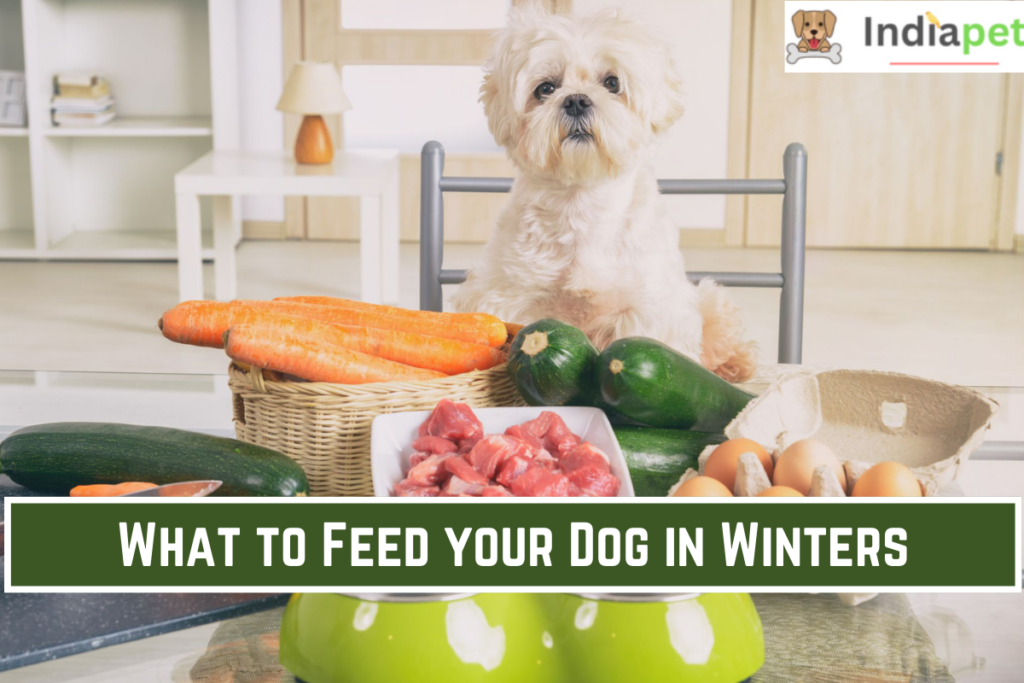What to Feed your Dog in Winters – As the temperature drops and winter sets in, our furry friends’ dietary needs change just like ours do. Ensuring your dog receives the right nutrition during the colder months is crucial for their health and well-being. In this blog, we’ll explore the best foods to feed your dog in winter, focusing on high-calorie diets, essential nutrients, and seasonal feeding tips to keep them happy and healthy.
____________________________________________________________________________________
Understanding Your Dog’s Nutritional Needs in Winter
Winter brings several challenges for dogs, including the need for extra energy to maintain body heat and a robust immune system to fend off seasonal illnesses. Here are some key considerations for your dog’s winter diet:
- Increased Caloric Intake: Dogs often require more calories in winter to keep warm, especially if they spend a lot of time outdoors. High-calorie dog foods can provide the necessary energy.
- Hydration: Despite the cold, hydration remains vital. Ensure your dog has access to fresh water, and consider adding moisture-rich foods to their diet.
- Healthy Fats: Incorporate healthy fats like omega-3 and omega-6 fatty acids to support coat health and provide extra energy.
- Protein-Rich Foods: Protein helps maintain muscle mass and overall health. Opt for high-quality protein sources such as chicken, beef, or fish.

Also read : What Vegetables are Good For Dogs?
___________________________________________________________________________________
Best Foods to Feed Your Dog in Winter
Let’s delve into some of the best food options and tips to keep your dog nourished and thriving during the winter months.
1. Warm, Nutritious Meals
Serving warm meals can be comforting for your dog during winter. Consider preparing homemade meals with ingredients like lean meats, vegetables, and whole grains. Warm up their food slightly to enhance its appeal and ease of digestion.
____________________________________________________________________________________
2. High-Calorie Dog Food
Look for high-calorie dog food formulas designed for active dogs or those living in colder climates. These formulas typically contain more fat and protein to meet your dog’s increased energy needs. Brands like Blue Buffalo, Orijen, and Hill’s Science Diet offer excellent options.
____________________________________________________________________________________
3. Healthy Fats
Incorporate sources of healthy fats, such as fish oil, flaxseed, and chicken fat. These not only provide energy but also support skin and coat health, keeping your dog’s fur thick and shiny, which is essential for insulation during winter.
____________________________________________________________________________________
4. Protein-Rich Foods

Protein is vital for maintaining muscle mass and overall health. Opt for high-quality protein sources like chicken, turkey, beef, lamb, and fish. You can also include eggs in your dog’s diet as they are an excellent source of protein and other essential nutrients.
Also read : What Dog Food is Best For Dobermans
____________________________________________________________________________________
5. Seasonal Vegetables and Fruits
Incorporate seasonal vegetables like sweet potatoes, carrots, and pumpkins, which are rich in vitamins and fiber. Fruits such as apples (without seeds) and blueberries can be added in moderation, providing antioxidants to boost your dog’s immune system.

____________________________________________________________________________________
Supplements to Boost Your Dog’s Immunity
Winter can be harsh on your dog’s immune system. Here are some supplements that can help keep your dog healthy:
- Fish Oil: Rich in omega-3 fatty acids, fish oil supports skin and coat health, reduces inflammation, and boosts the immune system.
- Probiotics: These support gut health, which is crucial for overall immune function. Look for probiotic supplements or foods like yogurt (without added sugar).
- Vitamin E: This antioxidant supports skin health and immune function. It can be found in supplements or foods like spinach and eggs.
____________________________________________________________________________________
Feeding Tips for Different Dog Breeds and Ages
Different dogs have different needs. Here are some tailored feeding tips:
- Senior Dogs: Senior dogs may need fewer calories but more high-quality protein and joint supplements like glucosamine and chondroitin.
- Puppies: Puppies require more calories and nutrients for growth. Ensure they receive balanced nutrition with adequate protein, fat, and essential vitamins.
- Small Breeds: Small breed dogs have faster metabolisms and may need more frequent meals with higher calorie content.
- Large Breeds: Large breed dogs can benefit from diets that support joint health and maintain a healthy weight to prevent stress on their joints.
Also read : Why is Breed-Specific Dog Food a Better Option than Standard Dog Food?
____________________________________________________________________________________
Keeping Your Dog Hydrated
Even in winter, hydration is essential. Dogs can get dehydrated in cold weather due to increased respiratory moisture loss. Ensure your dog has access to fresh water at all times. You can also add water to their dry food or serve wet food to increase their fluid intake.
____________________________________________________________________________________
Adjusting Feeding Schedules
Adjust your dog’s feeding schedule to match their winter activity levels. If your dog is less active in winter, you might need to reduce their food intake to prevent weight gain. Conversely, if they remain active or spend a lot of time outdoors, ensure they get enough calories to sustain their energy levels.
Also read : Why do dogs Eat Grass? Causes & Prevention
_____________________________________________________________________________________
What to Feed your Dog in Winter
Homemade Winter Dog Food Recipes
Consider making homemade meals for your dog using wholesome ingredients. Here’s a simple recipe:

Winter Chicken Stew:
- 2 cups diced chicken breast
- 1 cup cooked sweet potatoes
- 1/2 cup carrots
- 1/2 cup green beans
- 1/4 cup peas
- 1 tablespoon fish oil
- 2 cups chicken broth (low sodium)
Combine all ingredients in a pot and simmer until the vegetables are tender. Let it cool slightly before serving.
people also read : Ways to Keep Your Pet Healthy During Monsoon
__________________________________________________________________________________
Conclusion
Feeding your dog the right diet in winter is essential for their health and well-being. Focus on high-calorie foods, healthy fats, and protein-rich meals, and consider adding supplements to boost their immunity. Keep them hydrated and adjust their feeding schedule based on their activity levels. With these tips, your dog will stay healthy, happy, and warm all winter long.


